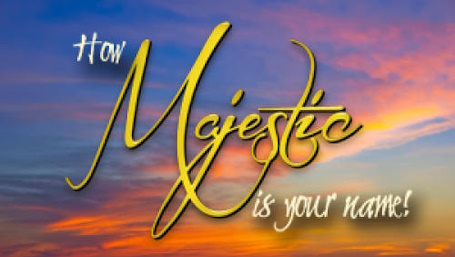SaturdayReflection
9th September 2023
David Mathis asks
************************
How Majestic Is Our Lord?
In 1977, California pastor Jack Hayford and his wife visited England during the Silver Jubilee - the twenty-fifth anniversary - of Queen Elizabeth's 1952 accession to the throne.
They were struck by the grandeur of the celebration and the manifest joy of the people in their monarch.
While there, they visited Blenheim Palace, birthplace of Winston Churchill and famous for the magnitude and stateliness some North Americans today know only through watching Downton Abbey.
Driving away from the palace, overcome with awe, Hayford found himself reaching for words - language that would transpose the weight of the earthly experience into the key of heaven.
As he stretched, the word that seemed most fitting, both to describe the stunning magnificence of the palace and how it pointed to the superiority of the reigning Christ, was 'majesty'.
According to a California newspaper's retelling of the story, as the Hayfords pulled themselves from that regal palace and drove away, Dr. Hayford asked his wife to take a notebook and write down some thoughts that were coming to him.
He then began to dictate the lyrics, the key, and the timing to a song now being sung by Christians worldwide.
("Story Behind the Song: 'Majesty,'" St. Augustine Record, August 13, 2015)
Hayford's impulse to reach for the word 'majesty', however much he knew it at the time (perhaps influenced by Psalm 8?), was deeply biblical.
Majesty is indeed a frequent and carefully chosen attribute in Scripture of the living God - a trait often overlooked in studies of the divine attributes, but an important witness of both the prophets and apostles.
God's majesty, a trait that sheds brilliant light on other well-rehearsed attributes.
God's majesty, a trait that is truly, deeply, wonderfully fit for worship, as Hayford intuited:
Majesty! Worship his majesty!
Unto Jesus be all glory, honour, and praise.
Majesty! Kingdom authority,
Flow from his throne, unto his own;
His anthem raise!
And God's majesty is perhaps nowhere as highlighted as in the refrain of Psalm 8, both its first line and last:
"O Lord, our Lord, how majestic is your name in all the earth!"
Those, like Hayford, who reach for the word majesty often find themselves standing before or remembering some natural or manmade wonder that is both imposing and, at the same time, attractive.
In our language, as in biblical terms, the word captures not only greatness but also goodness, both bigness and beauty, awesome power together with pleasant admiration.
Mountains might be the quintessentially majestic natural feature.
Psalm 76:4 declares in praise to God, "Glorious are you," and then adds, "more majestic than the mountains."
Majesty brings together both greatness and goodness, both strength and beauty.
So majesty is not only a fitting term for mountain majesties but a particularly appropriate descriptor of God, who is, above all, "the Majestic One".
Our God is so great, so admirable, so wonderful, so awesome in the eyes of his people, and so fearsome to his enemies, that the Hebrew 'kavod', Greek 'doxa', and English 'glory', will not suffice.
In the end, it may be majesty's poetic ring that makes it such a precious word and fit for worship.
As Jack Hayford groped for language to voice the wonder rising in his soul far beyond the legacy of English tradition and the largeness of its palaces - that is, reverence for the living God.
It may be interesting to watch, or just listen to Majesty
Listen here
Un-edited version and Bible references avaiable, on request
David Mathis (@davidcmathis)
is executive editor for desiringGod.org and pastor at Cities Church.
He is a husband, father of four, and author of Workers for Your Joy: The Call of Christ on Christian Leaders (2022).

